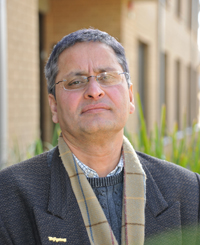 As state and political leaders discuss the future for Australian car manufacturing, Charles Sturt University (CSU) Professor of Economics Kishor Sharma believes innovation leading to differentiated products is the key to ensuring a viable industry.
As state and political leaders discuss the future for Australian car manufacturing, Charles Sturt University (CSU) Professor of Economics Kishor Sharma believes innovation leading to differentiated products is the key to ensuring a viable industry.
The departure of Holden from the Australian manufacturing sector by 2017, at the cost of 3 000 jobs, is high on the agenda of the Council of Australian Governments (COAG) meeting in Canbaerra today.
Earlier this year, Professor Sharma, from the School of Accounting and Finance at CSU in Wagga Wagga, said propping up the Australian car manufacturing sector with public funds was a waste of taxpayers' money. Professor Sharma said the money should be spent instead on supporting workers who lose their jobs.
Professor Sharma examined structural change in the Australian automotive industry in a 2012 paper published by World Economics: The Journal of Current Economic Analysis and Policy.
"The only way to make the Australian manufacturing sector viable is through reforms in the labour market and infrastructure sector to reduce cost of production," he said. "In addition, we need to be innovative in making new design cars for higher niche of the market in Australia and overseas. Producing standard cars in Australia is just not viable given the higher cost structure."
Professor Sharma said the fact Holden followed Ford's decision to withdraw from manufacturing cars in Australia by 2016, does not come as a surprise.
On the fate of the only remaining local car manufacturer, Toyota, Professor Sharama said, "The Government should carefully think and design incentives in such a way that the industry has motivation to invest in designing differentiated, rather than standard, products which can be marketed in both Australia and overseas. This means we need to invest more resources in research and development."
Professor Sharma said car manufacturers are owned by multi-national, foreign companies with the capacity to produce parts in countries like Thailand and Vietnam where wages are up to 70 per cent cheaper than those in Australia.
Read more in CSU News here.





Social
Explore the world of social